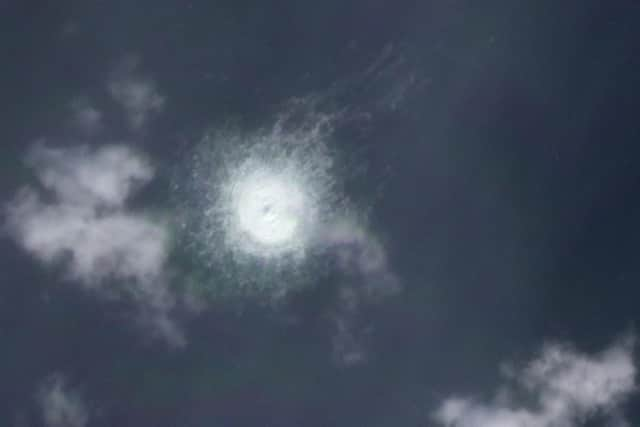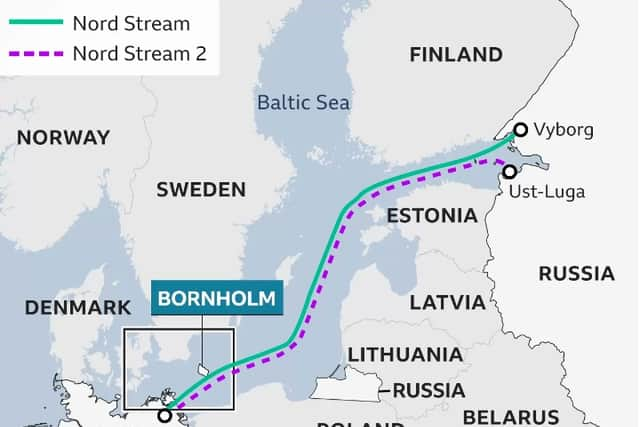Nord Stream leakage: what is Nord Stream, why is it leaking and what impact does it have
and live on Freeview channel 276
The underwater gas pipeline Nord Stream has been leaking gas into the Baltic Sea, causing a gas leak nearly a kilometre (0.6 miles) wide on the surface.
The first leakage was discovered on Monday night by the Nord Stream 2 operators, who discovered a sudden drop in pressure.
Advertisement
Hide AdAdvertisement
Hide AdAnd just a few hours later, a similar drop in pressure was discovered on the Nord Stream 1 pipeline.
As of Thursday morning, a total of four leaks have been reported by Swedish, Danish and German authorities.
Here is everything you need to know about the Nord Stream leakage in the Baltic sea.


What is Nord Stream and what is it used for?
Nord Stream is a pair of underwater pipelines, approximately 1,200 kilometres (700 miles) long, installed to transport natural gas from Russia to Germany in order to supply Europe.
Advertisement
Hide AdAdvertisement
Hide AdThere are two pipelines; Nord Stream 1 (NS1) and Nord Stream 2 (NS2), owned and operated by Nord Stream AG and Nord Stream 2 AG, in which Russian state owned company Gazprom owns a majority or completely.
Nord Stream 1 was inaugurated in November 2011, and had been transporting natural gas to Europe until its operation was halted by Putin due to the war in Ukraine.
When Russia recognised Donetsk and Luhansk People’s Republics, Germany suspended Nord Stream 2’s certificate on 22 February 2022 in the prelude to the invasion of Ukraine.
Because of this, Nord Stream 2 has never been in operation and its owner Nord Stream 2 AG went into bankruptcy.
Advertisement
Hide AdAdvertisement
Hide Ad

What has happened and what caused the leakage?
Following the reports of drops in pressure in both Nord Stream 1 and Nord Stream 2 off the coast of Sweden and the Danish island Bornholm, leaks had been discovered on both pipelines.
Swedish and Danish seismologists said they had registered two powerful blasts underwater in the vicinity of the pipeline leakages.
Swedish coast guard spokesperson Jenny Larsson told Swedish newspaper Svenska Dagbladet late Wednesday that two of the four are in Sweden’s exclusive economic zone, and the other two in Denmark’s.
This has caused several authorities including the EU to suggest the leakage was caused by sabotage.
Advertisement
Hide AdAdvertisement
Hide AdAs of now, no potential perpetrator has been suggested, and Russia has been early to condemn the alleged sabotage and saying that itis ‘affecting the energy security of the entire continent’.
The leakages and potential sabotage are being investigated by several authorities including coast guards and police from Sweden, Denmark and Germany.
What effect could it have on gas prices?
While none of the pipelines were in operation at the time, they both contained gas which has caused surface disturbance of over one kilometre (0.6 miles) in diameter, and ships have been told to avoid the area.
It is unclear whether the leakages will have any impact on gas prices in the future, but it has caused countries such as Norway to increase their security around its oil and gas pipelines.
Comment Guidelines
National World encourages reader discussion on our stories. User feedback, insights and back-and-forth exchanges add a rich layer of context to reporting. Please review our Community Guidelines before commenting.
